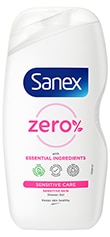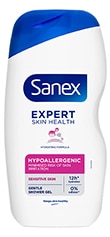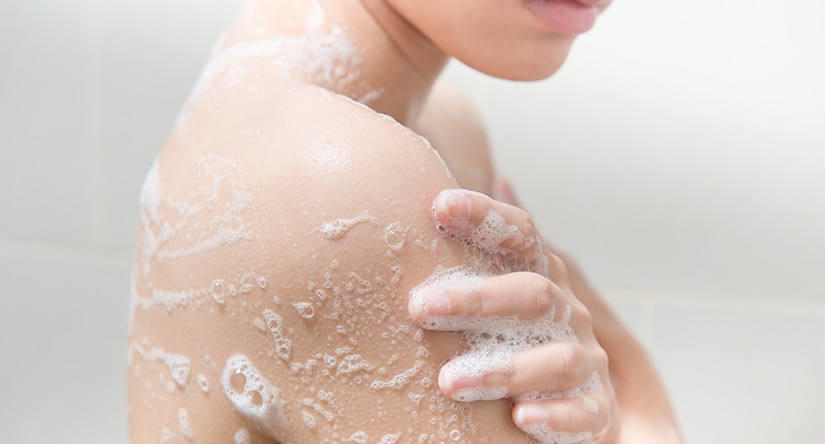Eczema and skincare
Eczema is a type of dermatitis (skin inflammation) that causes dry, itchy and inflamed skin. There are various types of eczema, but they all involve weakening of the skin’s natural protective barrier. This can make the skin more reactive to irritants and allergens, and can also lead to moisture loss and dehydration of the skin.
One of the most common triggers for an eczema flare-up (an increase in symptoms) is certain chemicals coming into contact with the skin. Some, like fragrances, are more likely to cause irritation than others. But everyone’s triggers are different, so even seemingly gentle chemicals can cause irritation for some people.
If you think about your daily skincare and personal care routine, you likely come into contact with many potentially irritating chemical ingredients throughout the day. They can be found in products like:
Toothpaste
Mouthwash
Laundry detergent
Make-up
Lip balm
Shower gel
Shampoo
Conditioner
Cleanser
Moisturiser
Serums
Perfume
Sunscreen
Chemicals aren’t the only potential irritants hiding in our daily routines, though. For example, hot water can also strip your skin of moisture and natural protective oils, making eczema symptoms worse.
Planning an eczema-friendly daily skincare routine
With so many potential irritants, planning a daily skincare routine with eczema may feel a little daunting. However, you might be relieved to hear that the most effective thing you can do is to keep things as simple as possible. Here are some tips to keep your skin happy and healthy…
1. Keep additives to a minimum.
Always check the label of your skincare products and try to choose those with minimal ingredients, or mostly natural ones. The following types of additives are common eczema triggers, so avoid or minimise them where possible:
Dyes/colourants.
Alcohols, e.g. isopropyl alcohol.
Parabens, e.g. methylparaben, used to prevent bacteria and mould growth.
Foaming agents like sodium lauryl sulphate (SLS), which is often found in shower gel, shampoo and toothpaste.
Fragrances or certain essential oils.
2. Look for hypoallergenic products.
Hypoallergenic products are those considered to have a low risk of triggering allergic reactions in people with sensitive skin. They usually exclude the types of additives and ingredients listed above, prioritising natural and/or gentle ingredients instead.
3. Go back to basics.
The more skincare products you use, the more chemicals your skin is exposed to, and the greater the risk of irritation. Try to simplify your routine as much as possible, weeding out any unnecessary products. If you love little luxuries like face masks or serums, use them infrequently and space them out from each other.
4. Look for single-benefit/single-active products.
Lots of skincare products today are multi-benefit, which means they may have a cocktail of active ingredients (e.g. niacinamide, retinol, vitamin C). If you react to these products, it can be hard to pick out which ingredient is causing you irritation. Instead, look for products with a single active ingredient so you can easily spot triggers and add or remove things from your routine.
5. Always remember to moisturise.
Eczema-prone skin needs a little extra help retaining moisture and staying hydrated. Look for an “emollient” moisturiser with ingredients that form a protective layer over the skin, along with nourishing ingredients like glycerin, shea butter or ceramides, which help to strengthen and repair the skin barrier. Use daily right after showering or bathing, and whenever your skin is feeling especially dry or itchy.
6. Choose soothing cleansers.
For skin that’s prone to dryness, choose an oil-based facial cleanser rather than a water-based product, as these will help to protect and nourish the skin barrier. Avoid antibacterial cleaners as they often contain irritating ingredients like salicylic acid. Instead, look for naturally soothing ingredients like chamomile and aloe vera.
When washing your body, choose a shower gel like Sanex Hypoallergenic Shower Gel for Eczema Prone Skin. Made especially for eczema-prone skin, it contains:
Hypoallergenic ingredients like moisturising glycerin and nourishing inulin.
No parabens, sulphates, soaps or dyes.
Gentle cleansing agents and a very mild scent.
For a completely fragrance-free option, try Sanex Zero Shower Gel. It also features coco-glucoside, an ultra-gentle cleansing agent made from sugar and coconut, that washes away dirt without stripping oils from the skin barrier.
7. Consider skipping toners and acids.
Toners often contain alcohol-based ingredients, which can dry out the skin. Exfoliating toners also contain acids (e.g. AHAs, BHAs), which can be seriously irritating for sensitive or inflamed skin. Some people with eczema find it best to skip these altogether, but if you do want to use them, try alcohol-free formulas and gentle, low-strength acids.
8. Keep it cool.
Hot water strips your skin of moisture and natural oils, which can make dryness and itchiness worse. Whether you’re washing your face or taking a shower, stick to lukewarm water and keep it short.
9. Be gentle.
Sensitive skin does not like to be scrubbed! Instead of harsh, rough materials like nylon cloths or loofahs, gently wash your face and body with soft materials like cotton cloths instead. Dry off with soft towels and pat your skin dry rather than rubbing.
10. Use sun protection.
Finally, try to use a daily sunscreen to protect your skin. Sun damage is extremely irritating to sensitive skin and is a major cause of barrier damage, not to mention premature ageing. Choose a product with SPF 30+ and wear it every day, even on milder days. Look for a product with zinc oxide or titanium dioxide blocking agents, as these tend to be less irritating.
It takes a little more effort to care for eczema-prone skin, but it doesn’t have to be daunting! With a few small changes to your skincare routine and some careful product selections, like Sanex Hypoallergenic Shower Gel for Eczema Prone Skin, you can keep your skin happy, healthy and glowing.
















